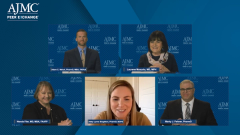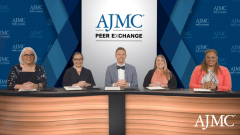
Navigating Vaccine Hesitancy
Vaccine hesitancy is a significant barrier to optimal RSV vaccine rollout.
Episodes in this series

Adam C. Welch, PharmD, MBA, FAPhA: What’s the significance of an ACIP [Advisory Committee on Immunization Practices] recommendation vs the official publication in MMWR [Morbidity and Mortality Weekly Report]?
Abby Lynne Singleton, PharmD, BCPS: There’s a lot of weight to that ACIP recommendation. Usually the CDC [Centers for Disease Control and Prevention] director will approve those recommendations from ACIP, and then they’re published in MMWR. That’s when it’s known as official guidance for the United States. It’s very forthcoming. Payers should be aware of what ACIP brings up and make sure that we’re ready to act to ensure that our patients can get the vaccine when it comes out.
Adam C. Welch, PharmD, MBA, FAPhA: Regarding the timing of when that publication is released vs when the ACIP has voted, in most cases we know. We’ll know that in June 2023. We should have an answer for RSV [respiratory syncytial virus]. We may not have the MMWR document until much later, but that later time frame will unfortunately be after RSV season has begun. So the timing becomes really important this RSV season.
Laurene Mascola, MD, MPH: Once the ACIP approves things, I don’t think I’ve ever seen the Centers for Disease Control director disapprove it. In my lifetime, I haven’t seen that. The ACIP sets the standard. As Abby said, then the director approves formally, and the MMWR report is written. But I haven’t seen many changes occur after the ACIP makes its recommendations.
Adam C. Welch, PharmD, MBA, FAPhA: We’re talking about a process where the timing becomes a particular interest. We’re talking about 160,000 older adult hospitalizations each year. It’s important.
Wanda Filer, MD, MBA, FAAFP: There are 6000 to 10,000 deaths.
Adam C. Welch, PharmD, MBA, FAPhA: And 6000 to 10,000 deaths.
Wanda Filer, MD, MBA, FAAFP: And those are only the ones we’ve identified.
Laurene Mascola, MD, MPH: Underestimated.
Adam C. Welch, PharmD, MBA, FAPhA: I’d like to address some of the barriers to RSV vaccines. Mr Feltner, what can providers and health care workers do to address this idea of vaccine fatigue? There are many vaccines. We’ve been hearing vaccines for so long. What can we do about that fatigue?
Marty J. Feltner, PharmD: With the COVID-19 pandemic, vaccine fatigue and hesitancy—we hadn’t seen that in my career, for the last 20 years—started to blossom. We need to educate our patients on the benefits of the RSV vaccine that’s coming out later this year. We need to sit down and talk to our patients, asking, “Why do you feel this way? Help me understand why you have a hesitancy for an RSV vaccine, which is very similar to influenza vaccine?”
We need to understand why our patients feel they don’t need this vaccine. First and foremost, if you’re a provider, try to figure that out. That’s key. We also need to educate. You need everybody on your team to buy in. I’m not going to be the 1 who talks to that patient to try to convince them that’s what we want to do. We need the entire team—your pharmacy technicians, your supportive pharmacy personnel, the medical providers, the nurses, everybody—to buy in to the RSV vaccine and help educate the public.
Adam C. Welch, PharmD, MBA, FAPhA: How can we identify patients at risk for RSV in the pharmacy as well as in the medical practice? Let’s start with the pharmacy.
Marty J. Feltner, PharmD: Pharmacists are uniquely positioned. You may have Grandma and Grandpa coming in for 1 of their heart medications, and you can have a pop-up window on your pharmacy database system that asks 1 simple question: “Have you had your RSV vaccine yet?” You can have your pharmacy technicians and cashiers help identify patients who are there picking up their prescriptions. Have posters and brochures inside your pharmacy or medical practice. We need to figure out the best method for us to communicate with our older patients. Do they like to text? My grandma and grandpa don’t necessarily text, so they may like a phone call. As a pharmacist, I enjoy talking to our patients. We need to figure out the best way to communicate with the patients who are right there. From the nursing side at the physician’s office, it’s probably at a well visit. It would be a question that you’d have to have checkmarked, like in the health care system. They ask “Have you had your RSV vaccine? Have you had your influenza vaccine?” as if you’re going to be hospitalized.
Wanda Filer, MD, MBA, FAAFP: I’m going to push that a littlebecause it’s not only the well visits but every visit.
Marty J. Feltner, PharmD: Yes.
Wanda Filer, MD, MBA, FAAFP: Most of the time, even if the patient is there for a chronic care visit, which is what we’re often doing, we’ll give them their immunizations. Prevention has to be a layer on all our visits. But to your point, you need a tickler system to say, this is what they’re due for—vaccines and other preventive strategies. The other critical part is that I have time to sit down with patients. They tell me things that are going on in their lives. I know if they want to take a trip to Greece next year. So we’re worrying about how we’re going to get that knee replaced so they can walk. At the same time, I’m going to talk to them about why they need an RSV vaccine so they can breathe and so they’re healthy. Using a patient-centric conversation, where you understand the patient’s goals and ideals, is critical to getting improved uptake of the vaccine.
Also, we don’t want to discourage those questions. I had a medical director say to me—this is really resonating for me—that maybe the term hesitancy is disrespectful. I’m guilty of it as well. Maybe we should be saying, “These patients have the right to ask questions. They have the right to be skeptical right now.” We have to be able to say, “I’m here to answer your questions. What can I do to make you feel comfortable with this?” And “I appreciate that you’re asking questions. I don’t want you to stop asking questions. That tells me I’ve empowered you as a patient.” That’s a pretty cool message.
Transcript edited for clarity.
Newsletter
Stay ahead of policy, cost, and value—subscribe to AJMC for expert insights at the intersection of clinical care and health economics.










